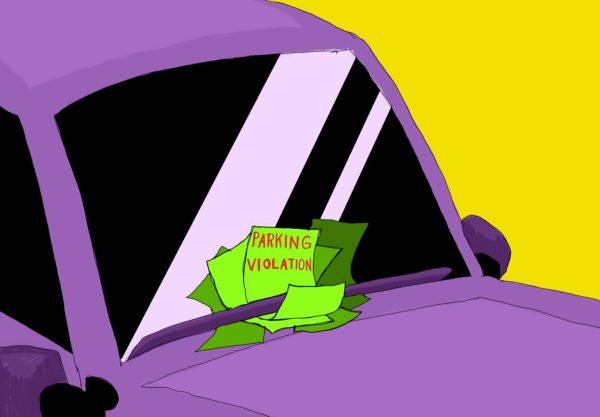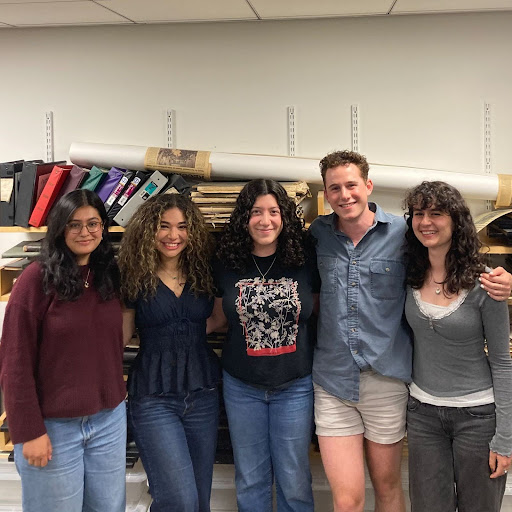In search of the hardest course
A course’s reputation will often precede it. Previous students post reviews on Factrak, spill the tea to their underclass acquaintances, and gossip about professors and assignments. By the time professors are introduced and syllabi distributed, it is typical for students to have a decent idea of what they’re getting themselves into for the semester. Don’t procrastinate on the final paper, others may have told them. You can’t get away with skimming the readings. Grading is tough. But by the beginning of his sophomore spring, Ben Weber ’21 had received a notably abnormal piece of such advice: Learn where to hide.
Weber, a theatre and mathematics major, was enrolled in Theatre 201: “Worldbuilding,” a major requirement centered around “practical projects” in which students “investigate a theatrical text and then dream-into-being the fictional worlds of a hypothetical production.” Junior and senior majors had informed his cohort that the course was difficult and time-intensive.
“These projects are basically glorified arts and crafts projects,” Weber said. “You can only build these projects in the theatre department — in the ’62 Center [for Theater and Dance] — because that’s where all the tools are. But the ’62 Center locks at midnight and CSS [Campus Safety and Security] comes. They do a sweep and they take you out of the building.”
With a finite amount of equipment, a limited amount of time to work with, and an unusually large class of 12 students, Weber said that it was difficult for members of the class to finish their work before midnight. So they hid.
“Some people would hide in little cupboards,” he said. “Some people would find these closets that CSS never checks. And then, basically from 11:55 to 12:30, because you never know when they’re coming, you take 35 minutes to hide in the dark so you aren’t caught. So that way, you could continue working until 4 a.m.”
Weber’s assigned work in the course ranged from an exercise in which he printed out a poster of Abraham Lincoln and had the class cover it in colored corn syrup, to a multi-stage collage that involved taking photographs of other photographs. “The point of the class is almost to turn off your brain and just start acting on impulse and make things,” he said.
Worldbuilding is notable for more than just its elaborate creative projects and late-night crafts. News of its infamous workload has not only been passed down through word-of-mouth — it has also been immortalized by Factrak. Data from Williams Students Online (WSO) reveals that of all courses with over 10 reviews, Theatre 201 is ranked as the most difficult, with an average score of 6.58 out of 7.
(It’s important to understand exactly what comparing Factrak course ratings in this manner tells us. That figure of 6.58 represents how difficult former Worldbuilding students who chose to write reviews thought the class was, not what the student body as a whole thinks of it.)
For former Theatre 201 Professor David Gürçay-Morris ’96, who taught the course annually until this year, the news was both surprising and expected. “It’s the difference between ‘your class is hard’ and the superlative of ‘hardest,’ where I have two different reactions,” he said.
According to Gürçay-Morris, part of the difficulty of the course lay in the intersection between its esoteric course material and its designation as a theatre major requirement. For many of his students, his class was their first exposure to the intricacies of set design.
“[This class is] about: How do I create the world on stage that allows a play to take place?” Gürçay-Morris explained. “How do I construct an environment that allows this story to be told, and then how do I add complexity and contradiction in order to make that richer?”
“The majority of students who come into Theatre 201 have not done any design work,” he continued. “A lot of times, what you had the opportunity to interface with at the high school level is a little more [on the] tech end… Design happens to be an area that, if you’re 18 or 19 years old, no matter how much theater you’ve done, no one has probably asked you to think about a play along those lines.”
While aware of his course’s reputation for its amount of difficult coursework, Gürçay-Morris said that he tried to prioritize students’ health, both physical and mental, over perfection. It was for this reason that he supported the policy of shutting down the ’62 Center at midnight.
“There’s two things: One of them is super practical, which is a theater is a building that has the ability to be dangerous,” he said. “It’s not a good idea to get on a ladder at 3 a.m. when you’ve had one and a half hours of sleep and try and focus a light, especially if you’re all alone in the building… I also just think, in terms of overall health, it’s not worth it… I want you to commit a good chunk of your life to me, but I’m not trying to eat your life.”
The ranking of Theatre 201 as the most difficult class taught at the College is especially surprising when considering that students generally perceive Div. III classes as the “hardest.” According to a Record survey sent out to 500 randomly selected unixes, 85 percent of 96 respondents believe that the “hardest overall class” lies within Div. III.
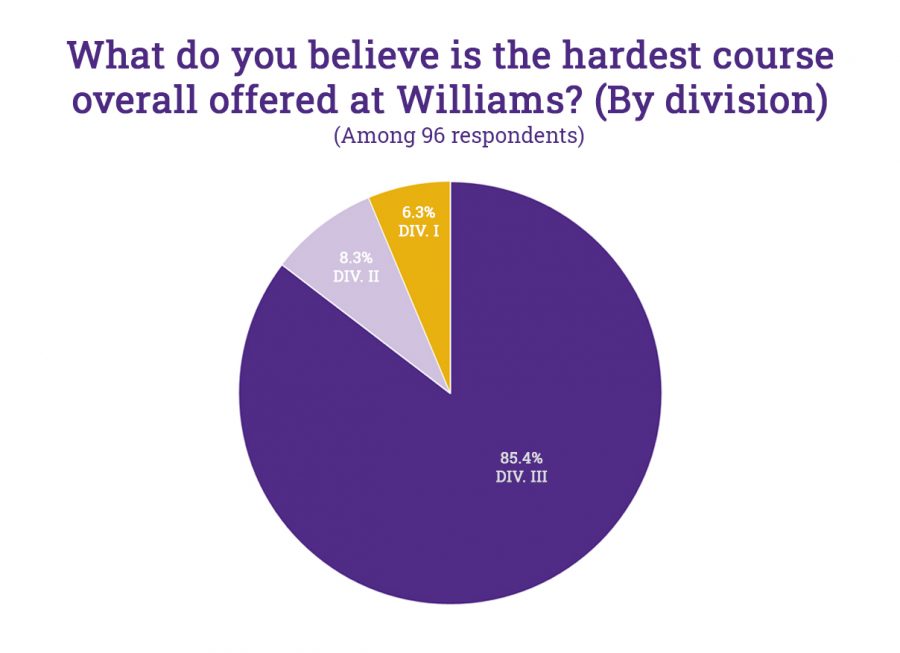
“[Div. III] classes are so inaccessible, they’re the hardest because they start from such a high level and many students start the class already behind,” one anonymous respondent wrote.
However, the Factrak data suggest a moderately different story: only 60 percent of the top 10 hardest-rated classes are classified as Div. III. The second hardest class is Psychology 352: “Clinical and Community Psychology,” last offered in Fall 2018 (at which point the class would have been in Div. II). While reviewers are generally positive regarding the professors and their experience in the course, they emphasize the heavy workload, which consists of readings and papers on top of a local internship.
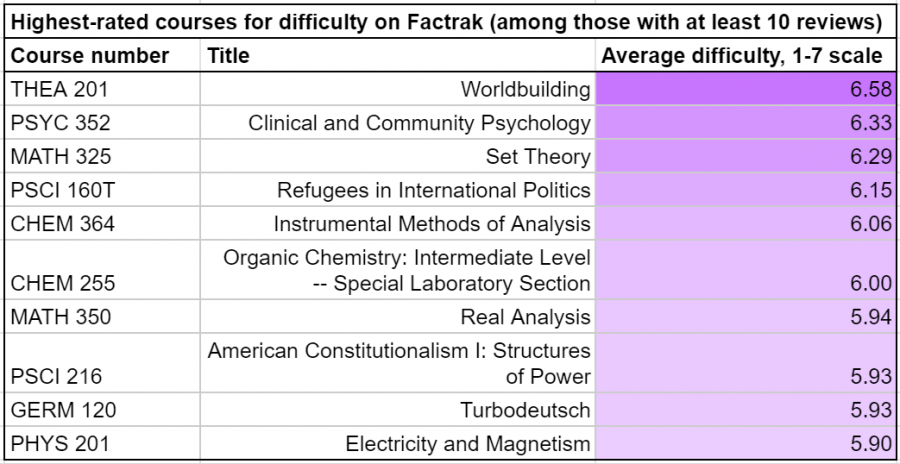
These reviews align with larger patterns of how students evaluate the difficulty of a course, which is, of course, largely subjective. 36 percent of 109 respondents to the survey indicated that either “Time Commitment” or “Workload” was their largest consideration for determining how hard a class is.
“I think time is a big thing, like how much time is necessary to understand the material,” Sarah Gantt ’23 said. Though she listed English 209: “Theories of Language and Literature” as the most difficult Div. I course she has taken so far, she found the class much more manageable once campus closed early last spring and she returned home.
“When we went home, it was actually helpful because I started to spend more time with the course material, because I had less to do at home during quarantine,” Gantt said.
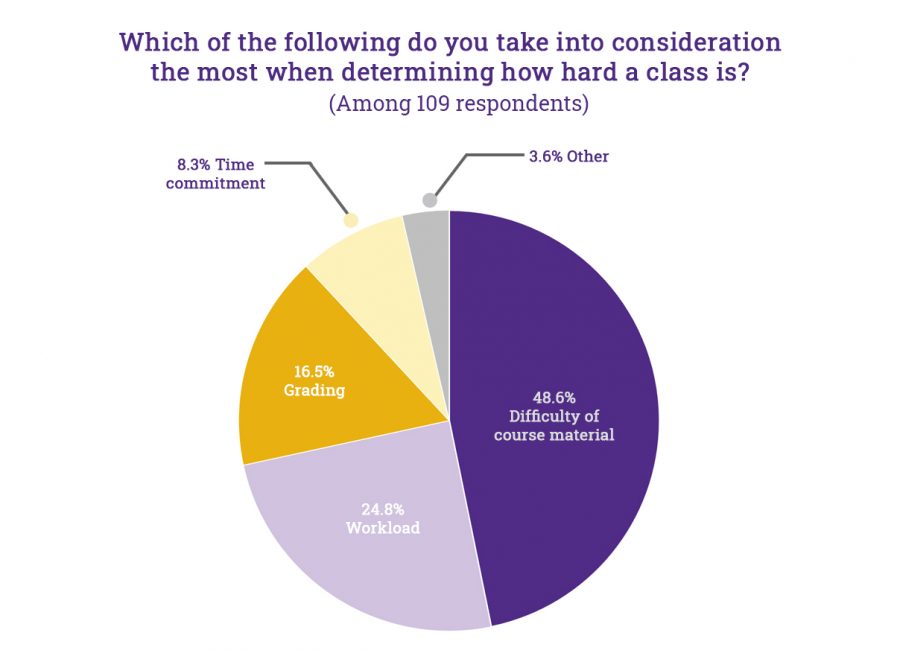
One consideration in particular stood out: 47 percent of respondents determined that “difficulty of course material” was the most important contributing factor to a difficult class. For Professors Thomas Smith ’88 and Amanda Turek of Chemistry 251: “Organic Chemistry: Intermediate Level,” this reasoning sounded familiar.
“I think part of what makes organic chemistry hard also is [that] people always say, ‘Oh, it’s a different language,’” Turek said. “Which is true, right? The structures, drawing all these lines with atoms, are a different language, and it takes a lot of time just to get comfortable with what you’re drawing and what it means.”
“I think at the core of it, too, is that we’re using these representations to sort of describe what’s happening, but the atoms, you can’t see,” Smith added. “So it’s very abstract, in a way, and yet we’re describing these very concrete things that are the foundations of everything, and so it’s a mind trip.”
According to the Record’s survey, courses in the organic chemistry sequence (Chemistry 156, 251, and 255) are consistently ranked among the hardest classes both in Div. III and overall. Neither Smith nor Turek were surprised by these results, though they considered them a shame.
“I think organic chemistry has such a reputation, right?” Turek said. “People ask, ‘What do you do?’ ‘Oh, I teach organic chemistry.’ There’s always some response along the lines of, ‘I’ve always heard that’s really hard,’ which I think is unfortunate.”
The far-reaching infamy of organic chemistry may also have negative consequences for students who take the course. According to Turek, many students come in with preconceived, and often ill-advised, notions of how to succeed in the course. “People often hear the way you get through it is by memorizing, which, if you bring that strategy into the class, I think you’re also setting yourself up to not do as well,” she said. “That’s another thing we could say: Don’t leave this [class] and tell people to memorize.”
German 120: “Turbodeutsch” is exactly what its title suggests. Professor of German Gail Newman, who both teaches the course and coined its name, explained that the German department introduced the idea for an intensive introductory course after an external review of the department found that German students in particular were more concerned with developing language skills, as opposed to cultural knowledge. The course squeezes two semesters’ worth of beginner German into one, meeting for a total of five hours per week, plus an additional mandatory weekly TA session.
Newman referred to her students as her “Turbos” and spoke fondly of the course. “It’s my baby,” she said. “I love it.” Though the workload is unrelenting and intense, she said, the class — which is capped at 12 students — becomes a community quickly. And by virtue of the course’s fast pace, results come early on.
“It’s such an exciting experience for people to realize that within three, four weeks, they’re actually able to say some stuff in another language,” Newman said.
“I find math hard, so I am not surprised that other people also find math classes hard,” Professor of Mathematics Thomas Garrity wrote in an email to the Record upon learning that his class, Math 325: “Set Theory,” was among the highest-rated courses on Factrak for difficulty.
Though Garrity said that he assigns a lot of homework, he noted that he had not gotten feedback from students indicating that Set Theory was harder than other courses of his. The course material itself deals with the foundational mathematical principles that underlie concepts as ostensibly simple as integer addition and multiplication.
“One of my favorite times in the semester is to see people in the class (all of whom are fairly mathematically mature) struggle with proving rigorously that 2+3 is 5 and 2×3 is six,” he wrote. “People find this challenging but intriguing.”
“Challenging but intriguing” seems to sum up students and professors’ feelings towards the top-rated classes for difficulty on Factrak — at least the electives. Though “tough,” Turbodeutsch was “a delight” and “definitely worth it,” according to anonymous reviewers. Despite being “proof-intensive” and “a lot of work,” the actual material involved in Set Theory was “really cool.”
As far as cross-division and cross-class comparisons were concerned, Weber’s opinions varied in how they lined up with Factrak’s consensus. Despite having taken Worldbuilding, he insisted in the Record’s survey that Math 482: “Homological Algebra” was the hardest class he had taken.
“It almost felt arbitrary saying that I thought homological algebra was harder than Theatre 201,” said Weber, a mathematics and theatre major. He had found both classes difficult, but in irreconcilably different ways. Both produced plenty of stress and all-nighters, but the subject matter could not have been more different.
“Part of the reason I wanted to be a math major was because I would see people doing math in movies, and I would see all these squiggly lines,” Weber said. “And I’m like, I want to know what those things mean. And you always say that the next class is going to be the one where the squiggly lines show up… Doing homological algebra made me feel like I was doing the squiggles. That was real math.”
Comparing across divisions was “apples and oranges,” Weber said. His only stab at doing so came with heavy qualifiers.
“Maybe this is a controversial topic,” he said. “I think that it’s easier for a professor to make a difficult Div. III class than a difficult Div. I class.” But he was careful to say that this did not necessarily translate into Div. III courses being consistently harder than Div. I ones.
Gantt was hesitant to generalize her experience to the wider student body. “I think I can compare courses within my own experience, but I think it’s harder to compare across different people majoring in different things,” she said. “I think enjoyment plays a lot into it. I feel like even if courses are really challenging, people can still really like it … and so that might make someone less inclined to put it as the hardest course.”
So where does our search for the College’s hardest course end? Certainly not at any easy or straightforward answer. Thirty students can sit through a lecture or a seminar and come out of it with entirely different thoughts and takeaways. Our experiences of difficulty are individual and inevitably skewed: even data from Factrak or the Record’s survey only tells us how students think of courses relative to their own experiences.
But what, then, to think of the courses that disproportionately come to mind when students are asked about the hardest? Economics 251: “Price and Allocation Theory,” a required course for the major, punched well above its weight in the Record’s survey among its fellow Div. II courses. Organic Chemistry and Real Analysis courses came out on top when respondents were asked which ones were the hardest overall. When compared to other courses of similar popularity, these ones led the pack.
Even these measures are suspect, however. Many more students have taken major requirements than one-off electives. One anonymous respondent to the Record’s survey made a similar point: “There aren’t that many physics majors so the courses may get fewer votes than other [Div. III] majors like math. I would seriously consider asking around about Physics 418, though, as I’d say most students in the department would agree that’s the hardest course at the school.”
The course in question, which is titled “Gravity,” has four reviews on Factrak.
Searching for the hardest course is no exercise in futility. There are undeniable patterns of perception of the difficulty of various types of classes — as well as marked divergences that can, and should, challenge how we evaluate and experience our time at the College.
As preregistration wraps up for the coming fall semester and students share their past experiences in courses with others, the decisions involved can get tricky. Superlatives often steer the conversation: This professor is the best. That course is the worst. This section is the easiest. Though they will always be reductive, they lend order to a vast set of options. When we inevitably wonder which classes are hardest, easiest, and most or least interesting, it makes sense to acknowledge the shortcomings of doing so, even in the most rigorous way.
But the pursuit of the unfindable hardest class can also lead to unexpected and interesting places — a German language table, a chemistry lab, or a cramped closet in the ’62 Center between the hours of midnight and 12:30 a.m.
Grady Yuthok Short ’23 is a political science and mathematics major, concentrating in justice and law studies and leadership studies, from Seattle, Washington....
Lindsay Wang ’24 is an English and statistics major from Pleasanton, Calif. She is a senior writer, and she previously served as the editor-in-chief,...




